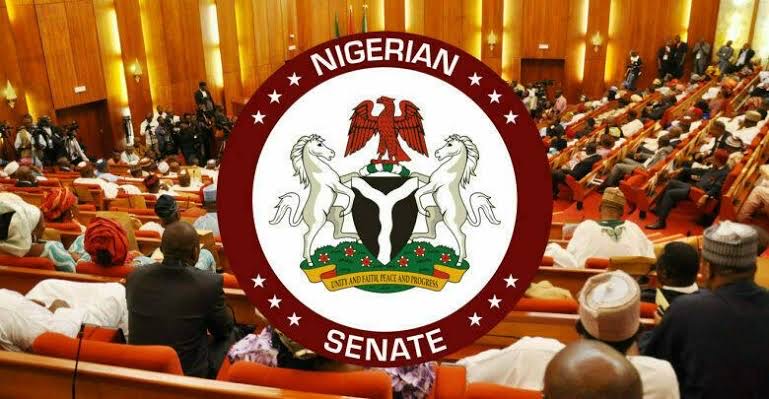BUILDING A VIRILE AND CONSTRUCTIVE OPPOSITION CAUCUS IN THE 10TH SENATE OF THE FEDERAL REPUBLIC OF NIGERIA FOR THE BENEFIT OF NIGERIAN
By Kayode Araba, Abuja
Simon Devou Nwadkwo, PDP Plateau North Minority Leader, stated that the 10th Senate of the Federal Republic of Nigeria is unique in several ways. First, it reckons reckoned to be the most diverse Senate in the history of Nigeria’s political development, composed of Senators from seven political parties, including the APC with 59 Members and the opposition parties of the PDP, Labour Party, NNPP, APGA, SDP, and YPP, producing 50 Members of the Senate.
In terms of the rules of procedure for the nomination of Minority Leadership of the Senate, Section 60 of the 1999 Constitution of the Federal Republic of Nigeria (as amended) empowers the Senate to make rules to regulate its procedures.
Premised on the constitutional mandate, and by the authority of the Nigerian Senate, the Senate Standing Orders 2022 (As amended) were issued as the rule book to guide the conduct of legislative business, including the appointment of principal officers by the Senate.
Consequently, The Senate Standing Orders (2022) in Chapter Six (6), pages 21 to 22, and Senate Rules Nos. 27, 28, 29, and 30 provided for the Minority Leadership positions, including the Minority Leader, Minority Whip, Deputy Minority Leader, and Deputy Minority Whip, “Who shall be Senators, nominated from the Minority Parties in the Senate.”
The critical emphasis here is that the Officers must be (1) Serving Senators of the Federal Republic of Nigeria, who are (2) Members of the Minorities Parties in the Senate, and the word nominate in the Oxford language dictionary means “Propose”. When a proposal is made, it is usually to an authority that has confirming powers, in this case, the President of the Senate. Accordingly, the President of the Senate received the proposal, announced it, and publicly gavelled the Minority Leadership nominees into confirmation in line with the Senate Standing Orders.
It is also important to inform Nigerians at this point that, in line with relevant laws, practices, procedures, conventions, and traditions, the Principal Officers of a Legislative Assembly are not balloted. It is not a competitive election moderated by INEC or any other umpire, but a matter that is rooted in age-long and well-established legislative practices and procedures. Despite the fact that whenever issues of political leadership are raised, you cannot discountenance the emergence of contentious voices, especially in a situation involving six political parties, This is expected because that in itself is the beauty and natural character of democracy, whereby we disagree without being disagreeable.
For us, this is democracy at its best and parliamentary politics at its finest as wheels for democratic consolidation in Nigeria.
However, rather than dwell on issues of parliamentary politics, we should now focus on putting machinery in place to unite all opposition parties and outline our Opposition Leadership Agenda to the Nigerian people that will ensure virile opposition assertiveness in the Senate to keep the ruling majority on their toes.
Legislative Agenda and Policy Focus of the 10th Senate Opposition Leadership
Parliament plays a critical role in representation and oversight for the attainment of good governance and sustainable development. While parliamentary oversight exercises control over the activities of the Executive arm of government, including other roles like the making of the national budget, in line with the provisions of the constitution, it also ensures efficiency, accountability, and value for money on government expenditures, policies, programs,and projects.
Legislative representation ensures deliberate constituents’ engagement through legislative outreach and quality legislation that promotes the socio-economic, infrastructural, and democratic consolidation of Nigeria. professional constituency office management system that satisfactorily brings representation and development home to the people, including representing the core aspirations and concerns of the people to the government and, in turn, government plans and programs to the people.
To effectively guarantee these key elements of a democratic parliament where opposition is tolerated and respected, we shall utilize the concept of “Specialized Parliamentary Caucuses” (SPCs) to lead a virile opposition in parliament in the 10th Senate. The SPCs area unique network of members who are passionate and committed to promoting good governance in specific thematic areas; a strong and assertive National Assembly for public interest and national Development; an Effective Oversight system; robust scrutinization of government proposals; Enhanced transparency in budget and budgetary process; Legislative Action on Security (LAS), Legislative Action on Infrastructure (LAI); Legislative Action on Youth Employment, Development and Job Creation (LAYEDEC) and Legislative Action on Health, Education, and Economy (LAHEE), Legislative Action on Gender representation (LAGR); Legislative Action Against Corruption (LAAC) and Legislative Action on Transparency in the utilization of Subsidy Savings (LAT-UAS) amongst other critical legislative action initiatives.
To achieve these, the leadership will prioritize the human capital development of opposition members through strategic partnerships and collaborations. Our SPCs focusing on the above-highlighted key thematic areas will further develop models and toolkits that will help opposition members periodically track Key Performance Indicators (KPIs) consistent with the opposition parties’ leadership vision of leading a virile and assertive Senate that will work in the interest of the Nigerian people in all areas of law-making, oversight, appropriation, confirmation of appointments, representation, loan approvals, and constituency services.
Under our leadership, the opposition parties will establish a formal secretariat with dedicated professional staff to ensure proper coordination and provide relevant legislative support to opposition Members to excel in their mandate as representatives of their constituents.
Specialised Parliams Countes
The Opposition Leadership SPCs will work to specifically ensure the following:
1) Help the government shift from line budgeting to citizens’ needs without adequate evaluation or bottom-up needs assessment to Program-Based Budgeting (CNTPBB) in terms of implementation, which will enable our constituents to benefit more from the national budget.
2) Helps to improve Government efficiency in resource allocation by linking ‘citizens needs to program performance to budget allocation’ through the budgetary process.
3) Work with foreign, regional, and national parliamentary organizations, such as the International Parliamentary Union (IPU), Global Parliamentary Association against Corruption, European Union Parliament, Commonwealth Parliamentary Association; National Institute for Legislative and Democratic Studies, Westminster Foundation for Democracy, Sustainable Development Goals Network, PLAC, YIAGA Africa, Centre for Democracy Development, International Republic Institute (IRI), African Parliamentary Advocacy and Reform Group (APARG), and National Democratic Institute, to strengthen opposition activities in parliament to deliver good governance and national cohesion for Nigeria’s democratic survival.
4) Strategically support Senators and grace their constituency programs to build solidarity and support base as a deliberate measure.
5) Initiate legislative actions through bills, motions, debates, and other legislative instruments to ensure a very assertive 10th Senate of the Federal Republic of Nigeria;
6) Vigorously pursue economic, infrastructural, and youth employment legislative actions, including support for government policy proposals that aligns with the opposition’s legislative interest preference and focus.
7) Establish a bipartisan outlet on issues of national interest supported by our Party’s vision and manifesto.
8) Establish and organize the annual Parliamentary Opposition Party’s Summit to strategize, review, and develop a roadmap for our role as opposition in the Senate.
9) Ensure the prominent visibility and vibrancy of opposition lawmakers in parliament.
10) Create thriving synergy amongst stakeholders, party leadership, and the Nigerian People.
11) Pursue and Lobby (where necessary) for the rights and privileges of opposition lawmakers.
12) Provide inclusive, teamwork-oriented, transparent, and honest leadership in service of Nigeria, our great party, and my colleagues. 13) Protect and guarantee the welfare of our Members.
Thank you.


